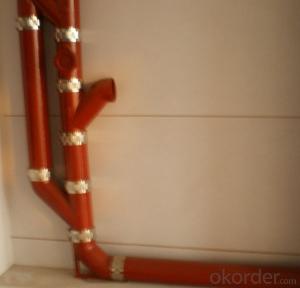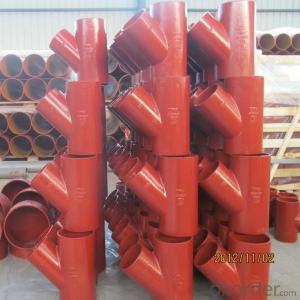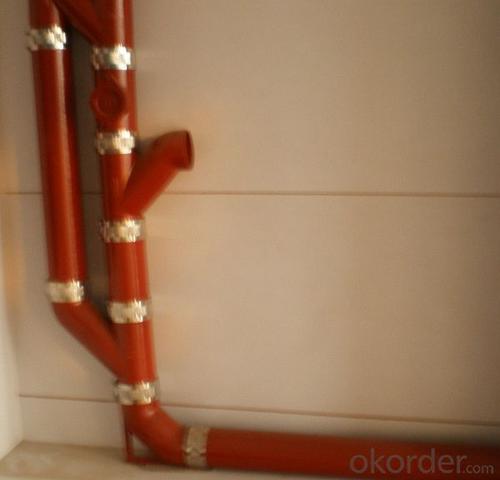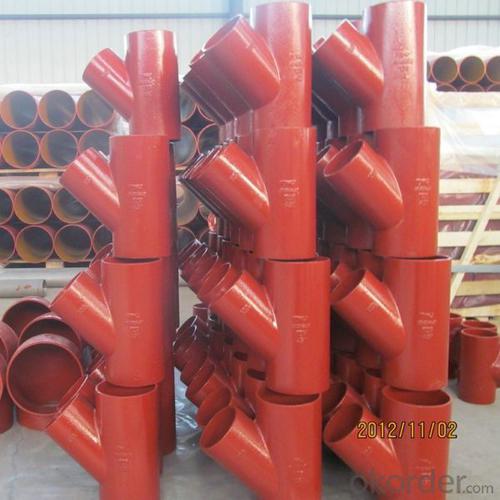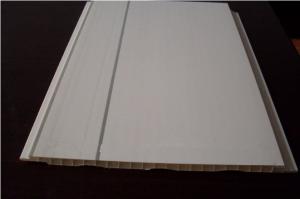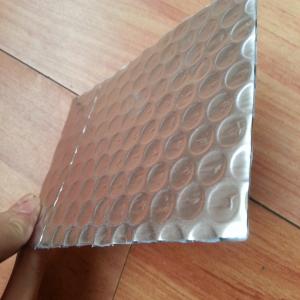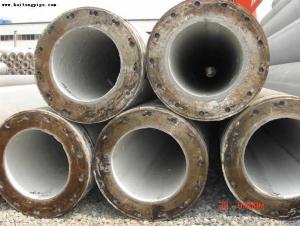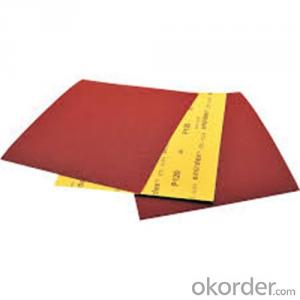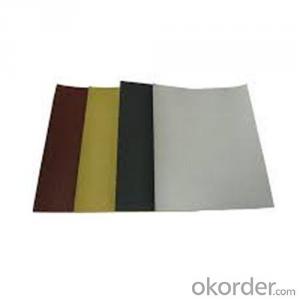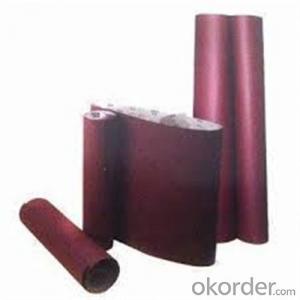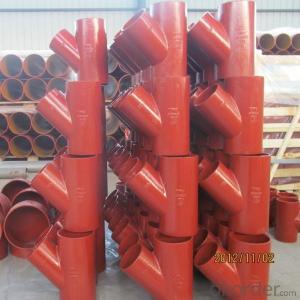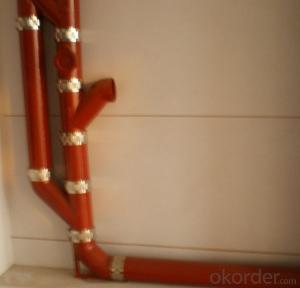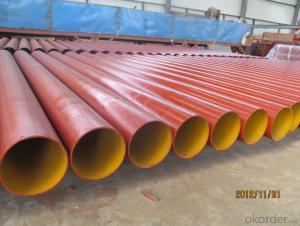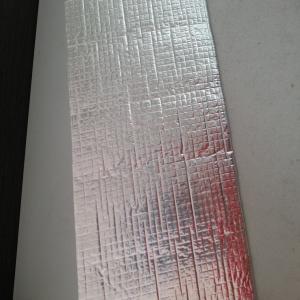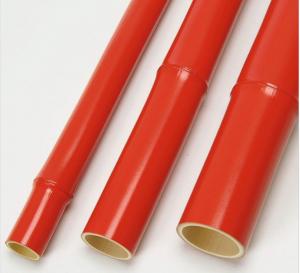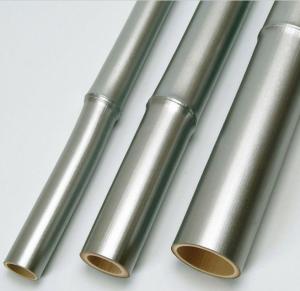CAST IRON FITTING EN877 DRAINAGE
- Loading Port:
- China Main Port
- Payment Terms:
- TT OR LC
- Min Order Qty:
- -
- Supply Capability:
- -
OKorder Service Pledge
OKorder Financial Service
You Might Also Like
Made from 100% recyclable materials, CMAX epoxy cast iron pipe systems are not only environmental friendly, but also satisfy many properties necessary to withstand the aggressive conditions both internal and external of the pipes and fittings: these properties include its excellent resistance to abrasion, corrosion, impact and fire. CMAX also has low noise transmission compared to common UPVC drainage pipe systems. CMAX is designed as long lasting building materials.
Standard:
CMAX epoxy cast iron pipe systems with nominal size between 40-300mm comply with BS EN 877.BS EN 877 guarantees the quality of the materials, dimensions and tolerances, mechanical properties(like water pressure, tensile strength and brinell hardness) appearance, and the standard coating for the epoxy cast iron pipes, fittings and couplings.
Strength:
Iron is well known for its strength and abrasion resistance. The shape and impact strength of CMAX products are unchanged under exposure of sunlight and weathering, while UPVC and PVC pipes would soften, deform and become brittle under intense temperature change.
Quiet:
CMAX’s sturdy and dense properties reduce pipe vibration a silent drainage system.Studies had proven iron is the quietest material out of all other common drainage system.
Non-Toxic and Non-Combustile:
No toxic gas will be emitted from CMAX in the event of fire. Iron is also non-combustile,so epoxy cast iron pipes and fittings are recoverable after fire.
Anti-Corrosive:
All CMAX epoxy cast iron pipes and fittings are internally and externally finished with corrosive resistant epoxy coating to prevent fouling and corrosion. The epoxy on CMAX epoxy cast iron pipes and fittings provides an excellent exterior under humid and tropical conditions.
Coupling:
Lightweight couplings are specially engineered to guarantee a strong, quick and easy connection between CMAX pipes and fittings. Made from stainless steel with rubber gaskets, the coupling match pipe and fittings non-corrosive properties.
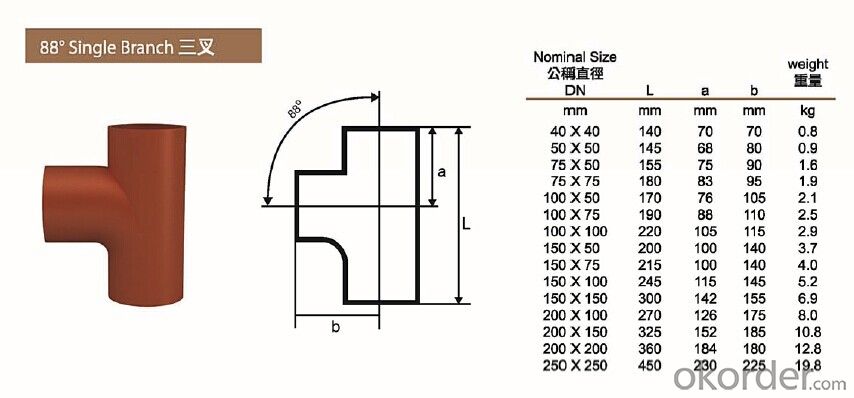
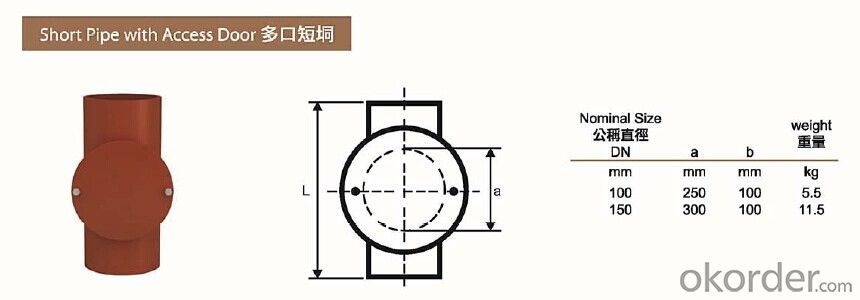
- Q: I am still 17 years old, in my senior year of high school. I know you cannot take the liscense exam until you are 18 and must take courses. I am wondering if you can take courses whether that would be online or class courses, while you are 17? (my birthday is in may). I am going to college next year majoring in business with real estate emphasis, and minoring in international business. Any help or suggestions into becoming a sucessful agent and starting young will be great!Thank you
- There many real estate license preparations courses available. They train you how to pass the exam. It is probably wise to take these courses just before you take the exam. The real estate major at Cal Poly Pomona is excellent training for a real estate job. One thing you do NOT want to be is a residential real estate agent. Many good ones are now saying You want frys with that
- Q: Im homeschooled and really want to be a real estate agent but it says that one of the requirements is to have a high school diploma. Would I have to go to college to get it or would it be different because Im homeschooled?
- What do you mean would I have to go to college to get it...To get what, your high school diploma? Colleges don't issue high school diplomas. You will receive your high school diploma by following the homeschool laws where you live. If allowed by law, your parents will issue your diploma.
- Q: Dear Sirs: I am a mexican citizen living in Israel willing to obtain a Florida Real Estate Associate license in order to referr international costumers to Florida real estate brokers.To be able to be paid by these brokers my commissions I must pass the Florida Real Estate Sales Associate examination and obtain my license. When I try to apply for a completed Application I must fill a Social Security number that I don't have because I'm not an american alien.When I search in the website of the Social Security office I have found that in order to apply for exams I DO NOT need a social security number to be able to take the exam.My question: How can I enroll for the examination without a Social Security number if your online application form does not allow me to proceed without a social security number?Thanks for your answer.Arturo Stern
- I think you need to contact the Florida Real Estate licensing agency. Also, try asking the broker in Florida under whom you plan on hanging your license. Minimally, you're going to need to talk to the IRS about getting an FIN (Federal Income tax Number). So that your broker knows what number to put on your 1099 at the end of the year. (you will need to pay taxes on this income) Is there a state income tax in Florida also? If so, why don't you try to get a license in a state (like Texas), with no state income tax. You'll keep more of what you earn that way. You can refer clients to any state in the country with a valid real estate license from any state, but keep in mind that the referral commission check will be written to your broker, and you'll get the percentage that you've negotiated with the broker. I guess you could try to find out what's the easiest state to get a broker's license in. Then you get 100% of the referral fee. Just had a last thought - do you have a Mexican real estate license? I think that would work. One more last thought. Have you spoken to the INS about a work permit?? Also, do you have an Israeli Real Estate License?
- Q: I'm thinking about going into real-estate after college. What are the steps to get there..like, what would be smart to major in in college. Do you go to school especially for real-estate?Also, is it ok not to major in business and still go to school for real-estate?What is an average salary for a real-estate agent?I'm really unsure about how to get there.-thanks!
- YOU HAVE TWO VERY TRUTHFULL AND HONEST ANSWERS,BUT LET ME ADD A LITTLE MORE. WITH ALL IT IS UPS AND DOWNS, IT IS THE BEST BUSINESS TO BE IN IF YOU ARE ,BRIGHT,DEDICATED,SOCIAL,AND RISK TAKER.YOU CAN COME WORK WITH/FOR ME,FOLLOW THE INSTRUCTION,HAVE INTEGRITY,AND I PROMISE YOU MAKE MORE MONEY THAN A BRAIN SURGEON.
- Q: I was thinking of learning the Real Estate appraisal business as a career change, and later on opening my own business under that after getting all the required licenses. Is it worth it?
- The pay is very good if you have enough business. That's up to you and how well you market yourself. Real estate is a little slow currently but if you can get in good with successful real estate agencies that are doing plenty of business you will have a good amount of work. You have to be really good at your appraisals and real estate agents will refer you to their clients and other agents. Good luck in your career.
- Q: what is this specific niche in real estate? i'm not too knowledgable on the subject...any help would be appreciated!
- Anyone who is good at real estate wholesaling will tell you how important it is to get and keep all of your potential buyers in order. You need to know their preferences for types of property and areas, as well as their goals . You must be driven to get the deals, you must be organized to keep accurate records of potential buyers and the money you make and you must be disciplined enough to set aside money for taxes on your profits each year.
- Q: THIS IS A REAL ESTATE MENTORING PROGRAM.
- yes philadelphia is a good program.
- Q: I'm thinking about getting into real estate, I wanna know is that a good career choice for someone who is currently living in Michigan? If so what is a good company to work for? Centruy 21 here is doing alot of hiring are they good or is it a catch? HELP!! ( You don't have to live in Michigan to answer, but I would love to here from an agent that has worked in Michigan)
- Yes I work as a full time real estate agent in south east Michigan, My wife and I work together. So I can say that you can make a living but it is not a normal job it is more like a lifestyle. We are always available for questions and often when something is planed RE gets in the way. If you enjoy helping people than you may like learning this trade. We are self employed allowing us to work as much or as little as we want. The Internet has changed the old ways of doing business, I do not think it will ever do away with this occupation. We can offer help from a vast pool of experience, we know how to buy or sell homes and most people do not have the time to learn. We can fix our own cars too but most of us use a mechanic. If you have the willingness to learn and work hard, currently the make a living point in Michigan is selling over 40 houses a year. I would suggest interviewing Brokers to see what the requirements and expected expenses are before choosing than find a mentor to learn from. Good luck.
- Q: I have enough money to invest in an apartment complex and I'm interested in real estate but I don't want to go in blindly. How should I learn about investing in real estate and getting experience in it?
- Join a real estate investor's club if there is one where you are. It's a very good way to learn about being a landlord.
- Q: I want to start a business flipping real-estate and I need a killer business plan can anyone help fine one?
- there is some great ideas on business and real estate in this article. i hope it helps you
Send your message to us
CAST IRON FITTING EN877 DRAINAGE
- Loading Port:
- China Main Port
- Payment Terms:
- TT OR LC
- Min Order Qty:
- -
- Supply Capability:
- -
OKorder Service Pledge
OKorder Financial Service
Similar products
Hot products
Hot Searches
Related keywords
